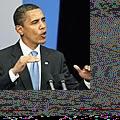The Obama Administration and Support for Democratic Reform
President Obama: Each nation gives life to this principle in its own way, grounded in the traditions of its own people. America does not presume to know what is best for everyone, just as we would not presume to pick the outcome of a peaceful election.
Narrator: In June 2009, President Barack Obama spoke about the importance of democracy. He made clear his intention to uphold democratic ideals in America and around the world.
From the beginning of his administration, Obama has demonstrated that commitment. One of his first acts as president was to close the detention center at Guantanamo Bay, Cuba. In his inaugural address in January 2009, he addressed those that use corruption and the silencing of dissent to hold onto power, saying that they were on the wrong side of history, and that America will “extend a hand if you are willing to unclench your fist.” The U.S. presidential election itself in November 2008 was the most widely followed election ever seen. Obama's election to the presidency inspired people everywhere, and sent a message of hope — especially to those citizens who cannot participate in a democratic process. Today, the U.S. government — along with other governments, foundations and international organizations — support democratic reform. Globalization has made democracy and its institutions an important part of political stability. U.S. Vice President Joseph Biden summarized this important fact in Munich earlier this year by saying that “Poor societies and dysfunctional states can become breeding grounds for extremism, conflict and disease.” Democratic reform is also an important part of economic development efforts. Development assistance is a key objective of the Obama administration's foreign policy. Transparent and democratic institutions are critical to ensure that assistance is reaching the people who need it the most, and that hard-won gains can be sustained and built upon. Over time, history has shown that democratic development is the best way to build a prosperous economy. In Cairo, Obama stated his administration's commitment to support democratic governments everywhere, even in the presence of disagreement on some issues: President Obama: Governments that protect these rights are ultimately more stable, successful and secure. Suppressing ideas never succeeds in making them go away. America respects the right of all peaceful and law-abiding voices to be heard around the world, even if we disagree with them. And we will welcome all elected, peaceful governments — provided they govern with respect for all their people.
Narrator: One of Obama's biggest themes in his speech was institution-building and the importance of civic education and engagement. Beyond holding elections, stable and functioning democracies require that governments maintain power through the consent of the people. Democratic institutions are critical in making sure minority rights are protected, dissenting views can be heard, and that the political process in which all citizens can participate is preserved.
Among the actions that President Obama supports for the promotion of democracy is an increase in funding for the National Endowment for Democracy and other nongovernmental organizations to support civic education; plus increases in foreign aid, debt relief, technical assistance and investment packages for post-conflict societies to show those citizens that democracy can deliver renewed hope and peace.
Obama has said that he will double foreign aid funding to $50 billion by 2012 and demand accountable reform of corrupt governments. Civic education is another important part of Obama's democracy-promotion effort. He has said he would fund a $2 billion Global Education Fund to ensure that citizens can contribute to the development of democratic societies. Obama expressed in Cairo his belief that citizens everywhere desire certain fundamental things: President Obama: …the ability to speak your mind and have a say in how you are governed; confidence in the rule of law and the equal administration of justice; government that is transparent and doesn't steal from the people; the freedom to live as you choose. These are not just American ideas; they are human rights. And that is why we will support them everywhere.

